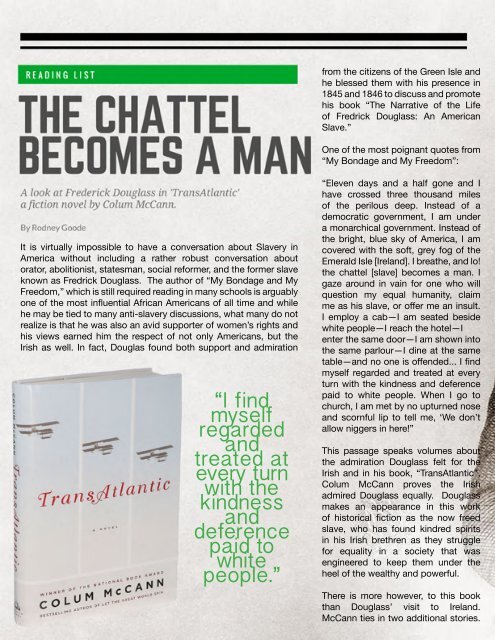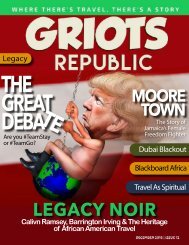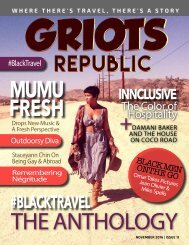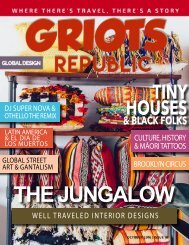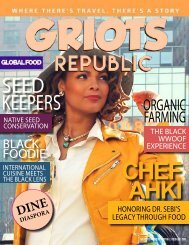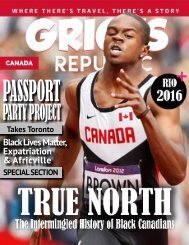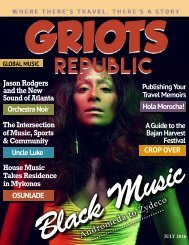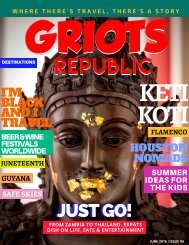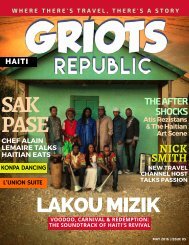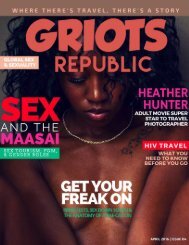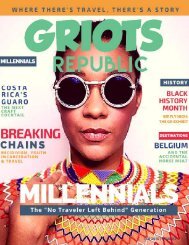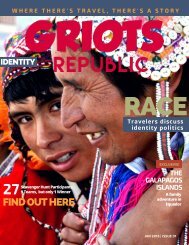GRIOTS REPUBLIC - An Urban Black Travel Mag - March 2016
ISSUE #3: IRELAND Profiles: Arlette Bomahou, Illa J, African Gospel Choir Dublin, Godfrey Chimbganda, Fabu D
ISSUE #3: IRELAND
Profiles: Arlette Bomahou, Illa J, African Gospel Choir Dublin, Godfrey Chimbganda, Fabu D
Create successful ePaper yourself
Turn your PDF publications into a flip-book with our unique Google optimized e-Paper software.
from the citizens of the Green Isle and<br />
he blessed them with his presence in<br />
1845 and 1846 to discuss and promote<br />
his book “The Narrative of the Life<br />
of Fredrick Douglass: <strong>An</strong> American<br />
Slave.”<br />
One of the most poignant quotes from<br />
“My Bondage and My Freedom”:<br />
It is virtually impossible to have a conversation about Slavery in<br />
America without including a rather robust conversation about<br />
orator, abolitionist, statesman, social reformer, and the former slave<br />
known as Fredrick Douglass. The author of “My Bondage and My<br />
Freedom,” which is still required reading in many schools is arguably<br />
one of the most influential African Americans of all time and while<br />
he may be tied to many anti-slavery discussions, what many do not<br />
realize is that he was also an avid supporter of women’s rights and<br />
his views earned him the respect of not only Americans, but the<br />
Irish as well. In fact, Douglas found both support and admiration<br />
“I find<br />
myself<br />
regarded<br />
and<br />
treated at<br />
every turn<br />
with the<br />
kindness<br />
and<br />
deference<br />
paid to<br />
white<br />
people.”<br />
“Eleven days and a half gone and I<br />
have crossed three thousand miles<br />
of the perilous deep. Instead of a<br />
democratic government, I am under<br />
a monarchical government. Instead of<br />
the bright, blue sky of America, I am<br />
covered with the soft, grey fog of the<br />
Emerald Isle [Ireland]. I breathe, and lo!<br />
the chattel [slave] becomes a man. I<br />
gaze around in vain for one who will<br />
question my equal humanity, claim<br />
me as his slave, or offer me an insult.<br />
I employ a cab—I am seated beside<br />
white people—I reach the hotel—I<br />
enter the same door—I am shown into<br />
the same parlour—I dine at the same<br />
table—and no one is offended... I find<br />
myself regarded and treated at every<br />
turn with the kindness and deference<br />
paid to white people. When I go to<br />
church, I am met by no upturned nose<br />
and scornful lip to tell me, ‘We don’t<br />
allow niggers in here!”<br />
This passage speaks volumes about<br />
the admiration Douglass felt for the<br />
Irish and in his book, “TransAtlantic”,<br />
Colum McCann proves the Irish<br />
admired Douglass equally. Douglass<br />
makes an appearance in this work<br />
of historical fiction as the now freed<br />
slave, who has found kindred spirits<br />
in his Irish brethren as they struggle<br />
for equality in a society that was<br />
engineered to keep them under the<br />
heel of the wealthy and powerful.<br />
There is more however, to this book<br />
than Douglass’ visit to Ireland.<br />
McCann ties in two additional stories.


